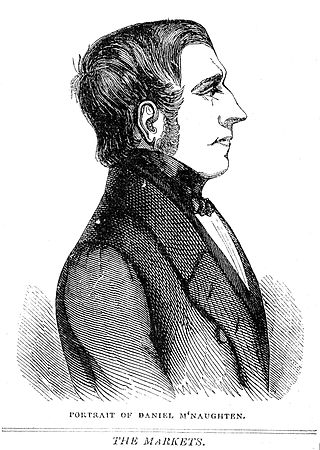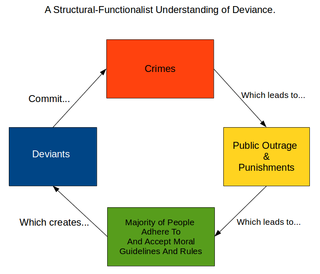The insanity defense, also known as the mental disorder defense, is an affirmative defense by excuse in a criminal case, arguing that the defendant is not responsible for their actions due to a psychiatric disease at the time of the criminal act. This is contrasted with an excuse of provocation, in which the defendant is responsible, but the responsibility is lessened due to a temporary mental state. It is also contrasted with the justification of self defense or with the mitigation of imperfect self-defense. The insanity defense is also contrasted with a finding that a defendant cannot stand trial in a criminal case because a mental disease prevents them from effectively assisting counsel, from a civil finding in trusts and estates where a will is nullified because it was made when a mental disorder prevented a testator from recognizing the natural objects of their bounty, and from involuntary civil commitment to a mental institution, when anyone is found to be gravely disabled or to be a danger to themself or to others.

The M'Naghten rule is any variant of the 1840s jury instruction in a criminal case when there is a defence of insanity:
that every man is to be presumed to be sane, and ... that to establish a defence on the ground of insanity, it must be clearly proved that, at the time of the committing of the act, the party accused was labouring under such a defect of reason, from disease of the mind, as not to know the nature and quality of the act he was doing; or if he did know it, that he did not know he was doing what was wrong.

Insanity, madness, lunacy, and craziness are behaviors performed by certain abnormal mental or behavioral patterns. Insanity can manifest as violations of societal norms, including a person or persons becoming a danger to themselves or to other people. Conceptually, mental insanity also is associated with the biological phenomenon of contagion as in the case of copycat suicides. In contemporary usage, the term insanity is an informal, un-scientific term denoting "mental instability"; thus, the term insanity defense is the legal definition of mental instability. In medicine, the general term psychosis is used to include the presence of delusions and/or hallucinations in a patient; and psychiatric illness is "psychopathology", not mental insanity.
In criminal law, diminished responsibility is a potential defense by excuse by which defendants argue that although they broke the law, they should not be held fully criminally liable for doing so, as their mental functions were "diminished" or impaired.
An affirmative defense to a civil lawsuit or criminal charge is a fact or set of facts other than those alleged by the plaintiff or prosecutor which, if proven by the defendant, defeats or mitigates the legal consequences of the defendant's otherwise unlawful conduct. In civil lawsuits, affirmative defenses include the statute of limitations, the statute of frauds, waiver, and other affirmative defenses such as, in the United States, those listed in Rule 8 (c) of the Federal Rules of Civil Procedure. In criminal prosecutions, examples of affirmative defenses are self defense, insanity, entrapment and the statute of limitations.

John Warnock Hinckley Jr. is an American man who attempted to assassinate U.S. President Ronald Reagan in Washington, D.C. on March 30, 1981, two months after Reagan's first inauguration. Using a .22 caliber revolver, Hinckley wounded Reagan, police officer Thomas Delahanty, and Secret Service agent Tim McCarthy. He critically wounded White House Press Secretary James Brady, who was left permanently disabled.

Forensic psychiatry is a subspeciality of psychiatry and is related to criminology. It encompasses the interface between law and psychiatry. According to the American Academy of Psychiatry and the Law, it is defined as "a subspecialty of psychiatry in which scientific and clinical expertise is applied in legal contexts involving civil, criminal, correctional, regulatory, or legislative matters, and in specialized clinical consultations in areas such as risk assessment or employment." A forensic psychiatrist provides services – such as determination of competency to stand trial – to a court of law to facilitate the adjudicative process and provide treatment, such as medications and psychotherapy, to criminals.
A Durham rule, product test, or product defect rule is a rule in a criminal case by which a jury may determine a defendant is not guilty by reason of insanity because a criminal act was the product of a mental disease. Examples in which such rules were articulated in common law include State v. Pike (1869) and Durham v. United States (1954). In Pike, the court wrote, "An accused is not criminally responsible if his unlawful act was the product of mental disease or mental defect."
In United States and Canadian law, competence concerns the mental capacity of an individual to participate in legal proceedings or transactions, and the mental condition a person must have to be responsible for his or her decisions or acts. Competence is an attribute that is decision-specific. Depending on various factors which typically revolve around mental function integrity, an individual may or may not be competent to make a particular medical decision, a particular contractual agreement, to execute an effective deed to real property, or to execute a will having certain terms.
Clark v. Arizona, 548 U.S. 735 (2006), is a United States Supreme Court case in which the Court upheld the constitutionality of the insanity defense used by Arizona.
Settled insanity is defined as a permanent or "settled" condition caused by long-term substance abuse and differs from the temporary state of intoxication. In some United States jurisdictions "settled insanity" can be used as a basis for an insanity defense, even though voluntary intoxication cannot, if the "settled insanity" negates one of the required elements of the crime such as malice aforethought. However, U.S. federal and state courts have differed in their interpretations of when the use of "settled insanity" is acceptable as an insanity defense and also over what is included in the concept of "settled insanity".
An ultimate issue in criminal law is a legal issue at stake in the prosecution of a crime for which an expert witness is providing testimony.
In the field of criminal law, there are a variety of conditions that will tend to negate elements of a crime, known as defenses. The label may be apt in jurisdictions where the accused may be assigned some burden before a tribunal. However, in many jurisdictions, the entire burden to prove a crime is on the prosecution, which also must prove the absence of these defenses, where implicated. In other words, in many jurisdictions the absence of these so-called defenses is treated as an element of the crime. So-called defenses may provide partial or total refuge from punishment.

Insanity in English law is a defence to criminal charges based on the idea that the defendant was unable to understand what he was doing, or, that he was unable to understand that what he was doing was wrong.
United States federal laws governing offenders with mental diseases or defects provide for the evaluation and handling of defendants who are suspected of having mental diseases or defects. The laws were completely revamped by the Insanity Defense Reform Act in the wake of the John Hinckley Jr. verdict.
Leland v. Oregon, 343 U.S. 790 (1952), was a United States Supreme Court case in which the Court upheld the constitutionality of placing the burden of persuasion on the defendant when they argue an insanity defense in a criminal trial. This differed from previous federal common law established in Davis v. United States, in which the court held that if the defense raised an insanity defense, the prosecution must prove sanity beyond a reasonable doubt, but Davis was not a United States constitutional ruling, so only limited federal cases, but not state cases. Oregon had a very high burden on defense, that insanity be proved beyond a reasonable doubt. At that time, twenty other states also placed the burden of persuasion on the defense for an insanity defense.

Criminal law is a system of laws that is connected with crimes and punishments of an individual who commits crimes. In comparison, civil law is where the case argues their issues with one entity to another entity with support of the law. Crimes can vary in definition by jurisdiction but the basis for a crime are fairly consistent regardless.

United States v. Brawner, 471 F.2d 969, is decision by the United States Court of Appeals for the District of Columbia Circuit in which the Court held that a person is not responsible for criminal conduct if at the time of such conduct as a result of mental disease or defect, he lacked substantial capacity either to appreciate the criminality of his conduct or conform his conduct to the requirements of the law.
The ALI rule, or American Law Institute Model Penal Code rule, is a recommended rule for instructing juries how to find a defendant in a criminal trial is not guilty by reason of insanity. It broadened the M'Naghten rule of whether a defendant was so mentally ill that he is unable to "know" the nature and quality of his criminal act, or know its wrongfulness, to a question of whether he had "substantial capacity to appreciate the criminality of [his] conduct". It also added a volitional component as to whether defendant was lacking in "substantial capacity to conform his conduct to the law". It arose from the case of United States v. Brawner.
Davis v. United States, 160 U.S. 469 (1895), is a criminal case establishing that in a federal case, the prosecution bears the burden of proof of sanity if an insanity defense is raised. It is a common law ruling that sets precedent in federal court, but is not a constitutional ruling interpreting the United States Constitution, so does not preclude states from requiring defendants to prove insanity, even to the point of requiring defendants to prove insanity beyond a reasonable doubt, as in Leland v. Oregon (1951).





